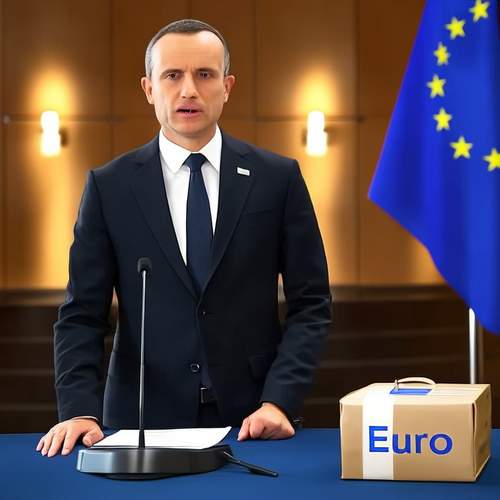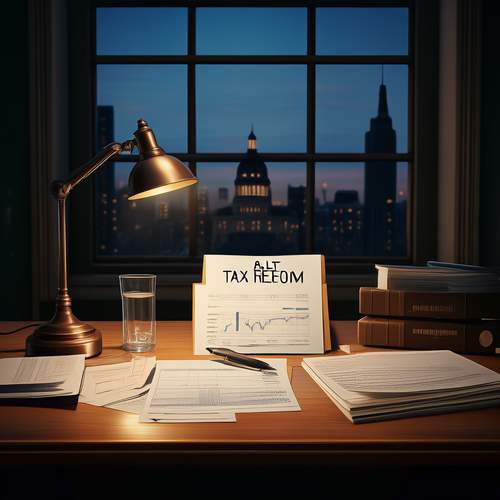The financial world is abuzz with activity, and the US dollar is feeling the heat. It's like a tightrope walker trying to balance amid gusts of fiscal winds. The source of these gusts? The tax bill that President Trump is pushing through Congress. It's a big, bold plan to cut taxes and roll back federal spending, but it's also raising eyebrows and heart rates among investors.
On Wednesday, the stock market took a tumble, dragging the dollar down with it. It was like a synchronized dive, with Wall Street stocks and the greenback both heading south. The reason? A bond sell-off that sent a clear signal: investors are uneasy. The yield on the 10-year US Treasury note shot up to nearly 4.6 percent, its highest level since February. It's like the bond market is saying, "Hey, we're not sure about this tax bill. It might add to the US deficit instead of trimming it."
Sam Stovall from CFRA Research put it plainly: "Investors are getting worried about the Trump tax bill that is working its way through Congress that is not going to be trimming the debt but actually adding to it." When bond yields climb, it's like a warning bell ringing in investors' ears. It means borrowing costs are going up, and that can make people nervous about the future.
Meanwhile, on Capitol Hill, the tax bill debate is taking center stage. It's like a high-stakes game of poker, with lawmakers trying to outmaneuver each other. And while all this is happening, the G7 finance leaders are gathered in Canada, talking about everything from the war in Ukraine to trade negotiations. It's a lot to take in, and it's making markets jittery.
Kathleen Brooks, research director at XTB, warned that a bond market crisis could be the spark that sends stocks tumbling and volatility surging. "It's also harder to recover from compared to the man-made tariff crisis," she added. Tariffs were already causing headaches, but now the bond market is adding its own brand of uncertainty.
In the midst of all this, Bitcoin is making headlines of its own. It hit a new record high of $109,499.76 on Wednesday. Investors are looking at new US legislation on cryptocurrency with a sense of optimism. It's like a glimmer of hope in a sea of uncertainty.
Over in Europe, the financial picture was mixed. London's FTSE closed slightly up, even though inflation data came in higher than expected. Analysts said this could slow down the pace of interest rate cuts by the Bank of England. It's like a tug-of-war between inflation and interest rates. Germany's DAX also ended on a positive note, but the CAC in Paris wasn't so lucky—it ended lower.
In the world of oil, prices initially surged on reports that Israel was planning a strike on Iranian nuclear sites. But then the US Energy Information Administration dropped a surprise announcement: oil stocks in the US had risen last week. It was like a rollercoaster ride for crude prices, with investors holding their breath.
Among individual companies, Google's parent Alphabet was a bright spot, gaining 2.9 percent after announcing plans to include advertisements in its new AI Mode for online search. It's a big move in the world of generative artificial intelligence chatbots, which have mostly avoided ads so far. It's like a new frontier being explored, with advertising as the key question.
On the other hand, Target had a rough day, falling 5.2 percent after another disappointing earnings release. The big-box chain is dealing with tariffs and the fallout from a boycott over its reversal on diversity pledges. It reported a 2.8 percent drop in sales. It's like a perfect storm of challenges hitting the company all at once.
So, what does all this mean? The financial world is in a state of flux, with the dollar under pressure, stocks tumbling, and investors on edge. The tax bill is a major player in this drama, with its potential to increase the US deficit causing ripples of concern. Meanwhile, Bitcoin's rise and the mixed performance in Europe add layers of complexity to the picture.
As investors navigate this turbulent landscape, one thing is clear: the decisions being made in Washington and on Wall Street will have far-reaching effects. The bond market's reaction is a warning sign, and the stock market's jitters are a reflection of the uncertainty. It's a time of high stakes and high emotions, with everyone watching closely to see what happens next.
The financial world is like a delicate ecosystem, where changes in one area can have ripple effects in others. The dollar's wobble, the stock market's dive, and the bond market's sell-off are all interconnected pieces of a larger puzzle. Investors, lawmakers, and companies are all players in this game, and the outcome will shape the financial landscape for years to come.




















